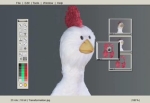 We had a chance to interview Simon Cowell a couple of years ago, back when he was quite happy to do TV commercials — having just wrapped a Vanilla Coke ad. But one brand he won’t endorse is Viagra. As the New York Post reports, the American Idol judge did not take kindly to a reported $2 million offer from Pfizer to be the face of its E.D. drug in the U.K. “Last year my agent rang me and said, ‘You’ve been offered an incredibly big, million-pound deal. It’s to be the face of Viagra,’ †Cowell tells the British edition of Glamour magazine. “And I just said, ‘Sorry, but that has to be a f—ing insult.’ †In the same interview, Cowell admits to using Botox, though apparently he hasn’t been offered the big bucks yet from Allergan. After the jump, read our 2003 interview with Cowell, in which he admits to being intimidated working on a commercial set.
We had a chance to interview Simon Cowell a couple of years ago, back when he was quite happy to do TV commercials — having just wrapped a Vanilla Coke ad. But one brand he won’t endorse is Viagra. As the New York Post reports, the American Idol judge did not take kindly to a reported $2 million offer from Pfizer to be the face of its E.D. drug in the U.K. “Last year my agent rang me and said, ‘You’ve been offered an incredibly big, million-pound deal. It’s to be the face of Viagra,’ †Cowell tells the British edition of Glamour magazine. “And I just said, ‘Sorry, but that has to be a f—ing insult.’ †In the same interview, Cowell admits to using Botox, though apparently he hasn’t been offered the big bucks yet from Allergan. After the jump, read our 2003 interview with Cowell, in which he admits to being intimidated working on a commercial set.
—Posted by Tim Nudd
Simon Cowell: On the Spot
By Tim Nudd
Adweek
26 May 2003
For the acid-tongued judge on Fox’s American Idol (and Pop Idol in the U.K), the hits keep on coming. As a music exec with BMG, Cowell, 43, is credited with developing some 25 No. 1 hits in England. Then came the Idol juggernaut (he helped craft both shows, and the winners sign with his label, S Records, a joint venture with BMG). Next up is Cupid, a summer reality show he’s producing for CBS in which former Campbell-Ewald copywriter Lisa Shannon roams America looking for her soul mate. Cowell may yet realize his dream of becoming Dick Clark–if he can get over his fear of actors.
Q: What’s the biggest difference between British and American pop culture today?
A: The main difference, from what I can ascertain since I’ve been over here, is [in the U.S.], you’ve got sheep following the sheep in the record industry, which is unhealthy. And you also have an incredibly unhealthy reliance on radio. The main difference we found about 15, 16 years ago in England was how to use television as a more powerful tool to break records and artists. And, of course, American Idol is proving the point of how powerful television can be when it’s used effectively.
Q. Are American contestants more susceptible to delusions of grandeur?
A. No, no, no–believe me, that’s an English trait as well. I’ve found the American contestants to be more polite, more respectful than the English counterparts. For instance, Ruben [Studdard] has said on the show, “My momma has taught me this and taught me that,†and it’s quite sweet to hear somebody say that. In England, they can be a bit brattish.
Q. What do you think of American advertising?
A. When I was living in England, I was quite scornful of it, because we only see it in dribs and drabs. I used to think American advertising was intrusive. Having seen how it works, particularly on a show like American Idol, how it’s proactive with the show, it’s very smart. The advertisers benefit, the show benefits, and therefore the audience benefits. In England we have all these weird rules which say you can’t advertise within a show if you’re the sponsor. The way American Idol has worked with their sponsors is superb.
Q. Did you enjoy shooting the recent Vanilla Coke ad?
A. Well, it’s quite intimidating working with proper actors. There’s always the feeling that the actors are thinking, “Who the hell does he think he is?†You know, “We’re actors, he’s somebody who’s become famous from a reality show.†But the good news was that Chazz [Palminteri] and his sidekick were really nice people. It was a blast.
Q. Simon Cowell, intimidated?
A. You’d be surprised, actually. I feel comfortable, normally, within my role. But when you suddenly take yourself out of that role and you’re working with professional actors, that is intimidating.
Q. What was your role in creating Cupid?
A. On the night of my birthday, Oct. 7, I had gone out with friends and we were talking about why shows like American Idol and Pop Idol work and how you could take the basis of the show into other areas. The only other area I could see this working as well in would be dating. And I thought it was so stupid that all the reality shows over here were turning into these weird dramas. Once I’d seen Mr. Personality I realized that that was no longer something you could put under the reality banner. There’s nothing real about that.
Q. Are people getting tired of reality television?
A. When it becomes popular, you get a flood of reality shows, and then only the good will survive. As long as you don’t get too stupid with it, then there’s always going to be a future. What I love about American Idol and Joe Millionaire is letting the viewer believe they’re looking through the keyhole and seeing something they shouldn’t be allowed to see. That to me is the perfect description of reality television. There’s going to be a huge future for it, but some of the silliness will go away.
Q. How did you choose Lisa Shannon to star in Cupid?
A. Ninety-nine percent of the girls who turn up for these kinds of shows now, when you audition, are actresses–either professionals or wanna-be’s. When you’re trying to create a reality television show, if you’re working with somebody whose endgame is just to be famous, then you’ve got a problem. So I tried to find somebody who fit the bill, but was genuine as to what the purpose of the show was. And she was the most genuine.
Q. What inspired you to get into the entertainment business?
A. Initially, it was lack of exam results and a desire to make some money. And I wanted to be in a business where you can have fun.
Q. Is there anyone you’re dying to work with in music or TV?
A. If I could spend a month with two people, it would be [Zomba Music founder] Clive Calder and Dick Clark. Clive is probably the best businessman in the last 20 years in the music industry. And Dick Clark is what I want to be, which is a combination of onscreen and off-screen. If I could mix those two people together.
Q. You have a bobblehead doll coming out. Does this mean you’ve fully integrated into American pop culture?
A. In a weird way, yes! I had so many meetings with would-be manufacturers, and it was all rubbish. But the one thing that appealed to me was the talking bobblehead doll.
Q. What does it say?
A. Oh, I can’t remember. It just insults you generally.










